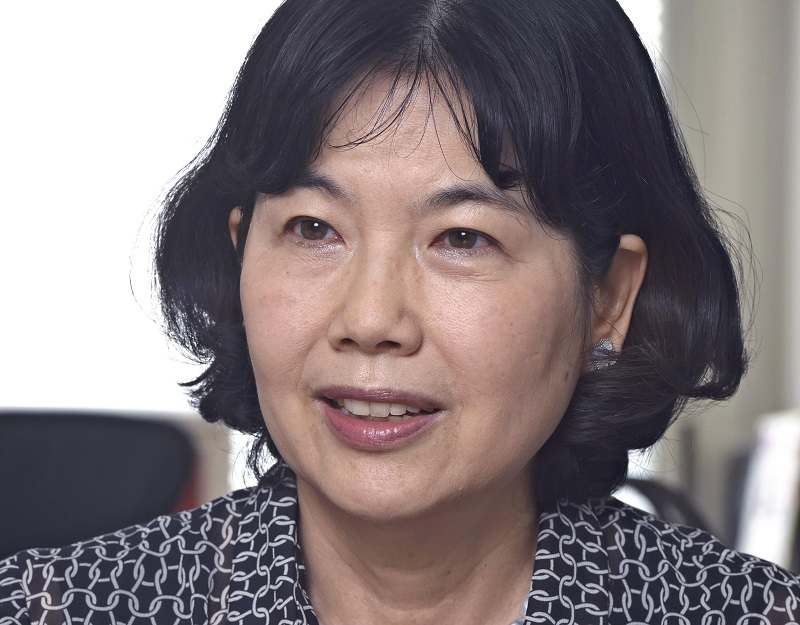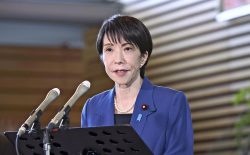
A display shows the yen-dollar exchange rate indicating an on going weak yen, in Chuo Ward, Tokyo, on June 14.
13:28 JST, July 4, 2022
The yen has plunged against the dollar this year to its lowest level in about two decades, causing prices of energy, foods and other goods to increase. Yomiuri Shimbun Staff Writer Kojiro Sekine recently interviewed Junko Shimizu, professor at Gakushuin University, who analyzed the situation and gave policy recommendations. The following is excerpted from the interview.
Weak yen, rising prices
For the economy of Japan, a weak yen has both positive and negative sides.
There once was a rule of thumb that “a weak yen is good,” because the country had long been an export-oriented economy. As a weak yen enhances the price competitiveness of Japanese products in foreign markets, it did more good than harm to the country’s economy as a whole. But now, a weak yen is considered “bad.”
There are two reasons for this.
One reason is that Japan’s trade balance went into the red in the wake of the Great East Japan Earthquake in 2011. Imports of fossil fuels such as natural gas and coal increased, the imports of which Japan depends heavily on, and this placed a greater burden on companies and households through hikes in electricity rates and the like. Consequently, the negative aspect of a weak yen has come to be recognized.
The other reason is that the weak yen has coincided with a rise in the prices of natural resources. It marks the first time since the 2000s that a weak-yen period has coincided with a period of rising prices of natural resources. In 2008 when the price of crude oil soared to a record high, the yen was strong against other currencies. And in 2015 when the yen’s decline advanced under the so-called Abenomics package of economic policies, crude oil prices were low.
Amid soaring prices for natural resources, due to Russia’s invasion of Ukraine and the COVID-19 pandemic, the yen’s decline has advanced, making its negative points conspicuous.
As the supply chains for Japanese manufacturers have been hit by the COVID-19 pandemic, some companies have been unable to make their products as they hoped to. Japan’s exports are unlikely to grow even in the days ahead, so there is a possibility that the nation’s trade balance will continue to be in the red.
If the U.S. Federal Reserve Board pushes ahead with interest rate hikes, and the Bank of Japan maintains its low-interest-rate policy, the gap in interest rates between Japan and the United States will become bigger, and thus the weak yen will continue. This is obvious from the viewpoint of economics.
Increase yen-denominated settlements
What is crucial is to take the perspective of using the weak yen to positive effect in the short run, and to build corporate traits and economic structures that are resilient to currency fluctuations in the future.
Looking at the March settlement of accounts, Japanese companies that have their production offshore have been in good shape, thanks to their earnings abroad increasing because of the weak yen. There is a strong sense among Japanese companies that have undergone hardships since the Plaza Accord, an agreement signed in 1985 to correct the dollar’s rise, of being prepared for the next phase of a rising yen even if their performance has become brisk thanks to a weak yen. Making the benefits of a weak yen instrumental to wage hikes and more investment at home is important.
In addition, a weak yen has the effect of making goods and services in Japan relatively cheaper. If the number of inbound visitors traveling to Japan – or foreign visitors’ consumption in Japan – recovers, domestic consumption will increase rapidly. Before the pandemic, the number of foreign visitors coming to Japan exceeded 30 million a year. There could be a supply shortage of those made-in-Japan products popular among foreign visitors, such as cosmetics.
In the mid- to long-term, it is vital to examine the settlement currency used by Japanese firms dealing with trading partners abroad. They are impacted by the weak yen because the proportion of yen in their trade settlements is low. According to statistics from the Finance Ministry, in Japan’s exports the share of yen-denominated settlements is less than 40% and in imports it is less than 30%.
Avoid distorting market
I hope that the government will put more emphasis on forward-looking policies, so as to encourage companies to implement reforms.
Policies that lessen the burden of rising natural resources prices are important, but the government should work out a policy, from the mid- to long-term perspective, that will encourage companies to become more resilient to currency fluctuation.
For instance, the government should create an environment in which it would be easier for Japanese companies to make yen-denominated settlements and encourage them to develop and manufacture products that differentiate them from the competition in international markets.
In the market, some are saying that in order to correct the yen’s weakness, the Bank of Japan should modify its large-scale monetary easing policy. But such calls are a big mistake.
As long as capital transfers are permitted under a free market economy, it is only natural for currencies to fluctuate. Any attempts to manipulate the exchange rate with a monetary policy would distort the market and discredit it, which may bring about a financial crisis.

Junko Shimizu, professor at Gakushuin University
Graduated from Hitotsubashi University. After a stint at a foreign-capital financial institution and the Industrial Bank of Japan, she obtained a doctorate in commerce at Hitotsubashi University. Since April 2012, she has been a professor at Gakushuin University. She is 63 years old.
Top Articles in Business
-

Prudential Life Insurance Plans to Fully Compensate for Damages Caused by Fraudulent Actions Without Waiting for Third-Party Committee Review
-

Narita Airport, Startup in Japan Demonstrate Machine to Compress Clothes for Tourists to Prevent People from Abandoning Suitcases
-

JR Tokai, Shizuoka Pref. Agree on Water Resources for Maglev Train Construction
-

Toyota Motor Group Firm to Sell Clean Energy Greenhouses for Strawberries
-

KDDI Opens AI Data Center at Former Sharp Plant in Osaka Prefecture; Facility Will Provide Google’s Gemini AI Model for Domestic Users
JN ACCESS RANKING
-

Japan PM Takaichi’s Cabinet Resigns en Masse
-

Japan Institute to Use Domestic Commercial Optical Lattice Clock to Set Japan Standard Time
-

Israeli Ambassador to Japan Speaks about Japan’s Role in the Reconstruction of Gaza
-

Man Infected with Measles May Have Come in Contact with Many People in Tokyo, Went to Store, Restaurant Around When Symptoms Emerged
-

Prudential Life Insurance Plans to Fully Compensate for Damages Caused by Fraudulent Actions Without Waiting for Third-Party Committee Review





















